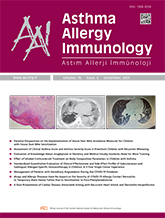


Objective: Allergen immunotherapy (AIT) employs incremental amounts of an antigen to selected patients to promote clinical tolerance towards the offending allergen. The adverse reactions to AIT include local side effects such as induration in the field of application, itching and hyperemia, or systemic side effects such as shortness of breath, urticaria, hypotension, abdominal pain, vomiting and anaphylaxis. It is important that patients receiving AIT and their parents know about possible adverse reactions and can intervene when necessary. We aimed to assess the knowledge and attitudes towards anaphylaxis of the caregivers/parents of allergic children who receive subcutaneous immunotherapy (SCIT).
Materials and Methods: We gathered information using a structured questionnaire on the subject demographics and clinical information as regards the type of allergies and symptoms; and employed specific questions to capture information on the knowledge and attitudes of the patients` parents about the symptoms and management strategies of anaphylaxis and the use of an epinephrine autoinjector. All pediatric allergy patients` parents who were received SCIT between 2016 and 2019 at the Yeditepe University Hospital`s pediatric allergy clinic were included in the study.
Results: We studied 101 participants who completed the questionnaire. The median age of the patients receiving SCIT was 12.0 (minmax, 5.0-17.0) years, and 52.5% of the study group were boys. Only less than half of the subjects had some idea about anaphylaxis. Seventy-eight percent had no idea that food might lead to anaphylaxis. Seventy percent of the participants did not expect SCIT to cause anaphylaxis; 6% had no idea about this anaphylaxis at all. Most of the parents did not know how to react to anaphylaxis and the majority had no clue about the epinephrine autoinjector.
Conclusion: We identified important knowledge gaps among the parents of children receiving SCIT about anaphylaxis or its management. We emphasize the necessity of educating the parents of children receiving SCIT on anaphylaxis as well as the application of epinephrine autoinjectors when indicated.